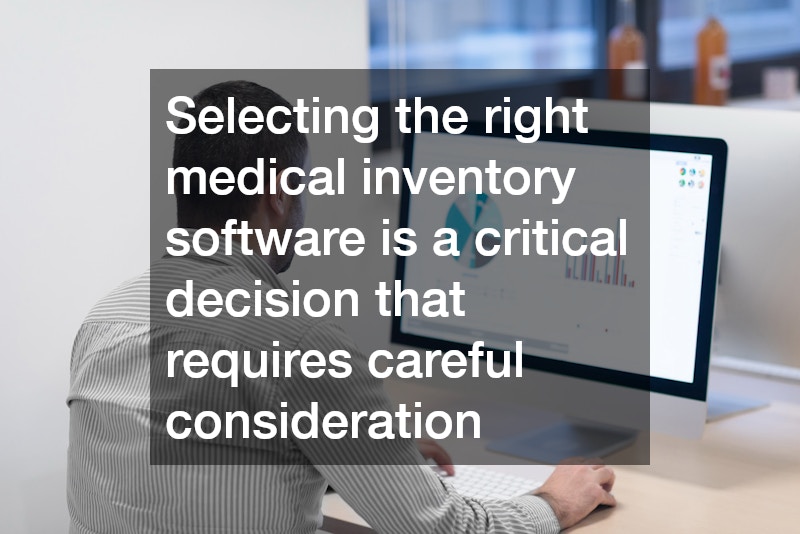
In today’s fast-paced healthcare industry, efficient management of medical inventory has become crucial. Medical inventory software systems have significantly streamlined the process of tracking and managing supplies in healthcare facilities, allowing organizations to save time, reduce costs, and improve overall efficiency. However, choosing the right medical inventory software can be a daunting task.
With numerous options on the market, it’s essential to understand the critical factors that should influence your decision. Factors such as user-friendliness, the ability to integrate with existing systems, and scalability are paramount to ensuring long-term success. This article delves into the top five considerations to bear in mind when selecting a medical inventory software to meet your specific needs. By thoroughly evaluating your requirements and the features offered by various software solutions, you can make an informed choice that will not only enhance operational efficiency but also improve patient care by ensuring critical supplies are always available. Ultimately, selecting the right software can contribute to both cost savings and better resource management in healthcare settings.
1. Integration with Existing Systems
When choosing a medical inventory software, one of the primary considerations should be its ability to integrate seamlessly with your existing systems. Your facility likely already uses various software for tasks such as patient management, billing, and scheduling. Ensuring that your new inventory software works harmoniously with these existing applications can prevent disruptions and enhance overall operational efficiency. Inadequate integration could lead to data silos, where information is not effectively shared between systems, causing inefficiencies and inaccuracies.
2. User-Friendliness and Training
The usability of medical inventory software is a key factor that contributes to its successful implementation. A user-friendly interface ensures that staff can quickly adapt to using the new system, minimizing downtime and potential errors. Additionally, you should consider the training options provided by the software vendor. Comprehensive training and support are crucial, as even the most intuitive systems require users to familiarize themselves with new functionalities and features. Before making a decision, request a demo or trial period to measure the software’s ease of use and the support offered.
3. Scalability and Customization
Growth and change are constants in the healthcare sector, and your medical inventory software should be able to accommodate this. It’s important to choose software that is scalable, meaning it can grow with your facility as you expand services or increase the volume of your inventory. Additionally, customization options can allow you to tailor the software to meet your specific practices and workflows. If the software is too rigid, it could impede your ability to adapt to the evolving needs of your healthcare facility.
4. Compliance and Security Features
Ensuring compliance with healthcare regulations is non-negotiable when it comes to selecting medical software. The software must adhere to standards such as HIPAA in the United States, ensuring that patient data and inventory information are secure and private. Investing in compliant software can protect your facility from legal repercussions and enhance patient trust. Moreover, robust security features are paramount to protect your sensitive inventory data from cyber threats. In today’s digital landscape, healthcare facilities are prime targets for cyber attacks; thus, ensuring the security features of your potential software is imperative.
5. Vendor Reputation and Support
The reputation of the software vendor is an important consideration that can’t be overlooked. Researching the vendor’s history, customer reviews, and case studies can provide valuable insights into their reliability and product performance. Additionally, you should assess the level of customer support provided. Whether it’s technical support, customer service, or training resources, strong support structures can significantly influence your software’s ongoing success. Always choose a vendor with a proven track record of reliability and customer satisfaction.
Selecting the right medical inventory software is a critical decision that requires careful consideration of various factors. From ensuring seamless integration with existing systems to understanding the importance of vendor reputation, each aspect plays a vital role in determining how well the software will serve your healthcare facility. By focusing on integration, ease of use, scalability, compliance, and vendor reputation, you can make an informed choice that will enhance inventory management efficiency. Additionally, it is important to assess the software’s ability to adapt to future technological advancements and the specific needs of your facility. An intuitive interface and robust support services can further ensure smooth operation and user satisfaction. Ultimately, the right medical inventory software will not only streamline operations but also contribute to improved patient care and facility productivity, reducing waste, and minimizing errors. By making a thoughtful decision, healthcare organizations can improve their bottom line while maintaining high standards of care.
.






